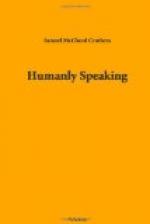But letting bygones be bygones, and not seeking to justify the enthusiasms of the nineteenth century, one may return to Dickens as to the home of one’s childhood. How do the old scenes affect us? Does the charm remain? When thus we return to Dickens, we are compelled to confess the justice of the latter-day criticism. In all his writings he deals with characters and situations which are wholly obvious; at least they are obvious after he deals with them. Not only is he without the art which conceals art, but, unlike some novelists of more recent fame, he is without the art that conceals the lack of art He produces an impression by the crude method of “rubbing it in.” There are no subtleties to pique our curiosity, no problems left us for discussion, no room for difference of opinion. There is no more opportunity for speculation than in a one-price clothing store where every article is marked in plain figures. To have heartily disliked Mr. Pecksniff and to have loved the Cheeryble Brothers indicates no sagacity on our part. The author has distinctly and repeatedly told us that the one is an odious hypocrite and that the others are benevolent to an unusual degree. Our appreciation of Sam Weller does not prove that we have any sense of humor save that which is common to man. For Mr. Weller’s humor is a blessing that is not in disguise. It is a pump which needs no priming. There is no denying that the humor, the pathos, and the sentiment of Dickens are obvious.
All this, according to certain critics, goes to prove that Dickens lacks distinction, and that the writing of his novels was a commonplace achievement. This judgment seems to me to arise from a confusion of thought. The perception of the obvious is a commonplace achievement; the creation of the obvious, and making it interesting, is the work of genius. There is no intellectual distinction in the enjoyment of “The Pickwick Papers”; to write “The Pickwick Papers” would be another matter.
It is only in the last quarter of a century that English literature has been accepted not as a recreation, but as a subject of serious study. Now, the first necessity for a study is that it should be “hard.” Some of the best brains in the educational world have been enlisted in the work of giving a disciplinary value to what was originally an innocent pleasure. It is evident that one cannot give marks for the number of smiles or tears evoked by a tale of true love. The novel or the play that is to hold its own in the curriculum in competition with trigonometry must have some knotty problem which causes the harassed reader to knit his brows in anxious thought.




